Susan E. Greisen's Blog, page 5
February 28, 2024
Pay It Forward
We have opportunities to be kind, be helpful, or pay it forward. Often it is not calculated…just a spontaneous gesture. In my travels this past year I have met many interesting people. This is a story of one lovely woman I met on one my transatlantic flights.
I sat next to a 50 + year-old Kenyan woman. She was very shy and kept to herself as she sat in the middle seat of our 14-hour plane flight across the Atlantic. Her African English accent was strong, but because of my familiarity, we communicated well. After a time I learned her name was Nora, a Baptist Minister heading to Renton, WA to visit another congregation. (Name and place changed to protect privacy)
She had difficulty with the many buttons and levers surrounding her seat. As I assisted with troubleshooting her needs, using the AV touch screen, call button, headphones, light, and adjusting her table, she told me this was her first-ever flight and she was not familiar with the flying protocol.
[image error]Pexels.com" data-medium-file="https://susangreisen.files.wordpress...." data-large-file="https://susangreisen.files.wordpress...." data-attachment-id="5508" data-permalink="https://susangreisen.com/2024/02/28/p..." data-orig-file="https://susangreisen.files.wordpress...." data-orig-size="1880,1254" data-comments-opened="1" data-image-meta="{"aperture":"0","credit":"","camera":"","caption":"","created_timestamp":"0","copyright":"","focal_length":"0","iso":"0","shutter_speed":"0","title":"","orientation":"0"}" data-image-title="seats with screens in airplane" data-image-description="" data-image-caption="Photo by Kelly on Pexels.com
" data-medium-file="https://susangreisen.files.wordpress...." data-large-file="https://susangreisen.files.wordpress...." srcset="https://susangreisen.files.wordpress.... 600w,https://susangreisen.files.wordpress.... 900w,https://susangreisen.files.wordpress.... 1200w,https://susangreisen.files.wordpress.... 1500w,https://susangreisen.files.wordpress.... 1800w,https://susangreisen.files.wordpress.... 1880w" alt="" data-height="1254" data-id="5508" data-link="https://susangreisen.com/?attachment_..." data-url="https://susangreisen.files.wordpress...." data-width="1880" src="https://susangreisen.files.wordpress...." />[image error]Pexels.com" data-medium-file="https://susangreisen.files.wordpress...." data-large-file="https://susangreisen.files.wordpress...." data-attachment-id="5513" data-permalink="https://susangreisen.com/2024/02/28/p..." data-orig-file="https://susangreisen.files.wordpress...." data-orig-size="1880,1253" data-comments-opened="1" data-image-meta="{"aperture":"0","credit":"","camera":"","caption":"","created_timestamp":"0","copyright":"","focal_length":"0","iso":"0","shutter_speed":"0","title":"","orientation":"0"}" data-image-title="shallow focus photo of airplane s air conditioner control panel" data-image-description="" data-image-caption="Photo by Kai Pilger on Pexels.com
" data-medium-file="https://susangreisen.files.wordpress...." data-large-file="https://susangreisen.files.wordpress...." srcset="https://susangreisen.files.wordpress.... 600w,https://susangreisen.files.wordpress.... 900w,https://susangreisen.files.wordpress.... 1200w,https://susangreisen.files.wordpress.... 1500w,https://susangreisen.files.wordpress.... 1800w,https://susangreisen.files.wordpress.... 1880w" alt="" data-height="1253" data-id="5513" data-link="https://susangreisen.com/?attachment_..." data-url="https://susangreisen.files.wordpress...." data-width="1880" src="https://susangreisen.files.wordpress...." />[image error]Pexels.com" data-medium-file="https://susangreisen.files.wordpress...." data-large-file="https://susangreisen.files.wordpress...." data-attachment-id="5507" data-permalink="https://susangreisen.com/2024/02/28/p..." data-orig-file="https://susangreisen.files.wordpress...." data-orig-size="1880,1253" data-comments-opened="1" data-image-meta="{"aperture":"0","credit":"","camera":"","caption":"","created_timestamp":"0","copyright":"","focal_length":"0","iso":"0","shutter_speed":"0","title":"","orientation":"0"}" data-image-title="screen built into the back of the seat" data-image-description="" data-image-caption="Photo by Max Chen on Pexels.com
" data-medium-file="https://susangreisen.files.wordpress...." data-large-file="https://susangreisen.files.wordpress...." srcset="https://susangreisen.files.wordpress.... 600w,https://susangreisen.files.wordpress.... 900w,https://susangreisen.files.wordpress.... 1200w,https://susangreisen.files.wordpress.... 1500w,https://susangreisen.files.wordpress.... 1800w,https://susangreisen.files.wordpress.... 1880w" alt="" data-height="1253" data-id="5507" data-link="https://susangreisen.com/?attachment_..." data-url="https://susangreisen.files.wordpress...." data-width="1880" src="https://susangreisen.files.wordpress...." />[image error]Pexels.com" data-medium-file="https://susangreisen.files.wordpress...." data-large-file="https://susangreisen.files.wordpress...." src="https://susangreisen.files.wordpress...." alt="" class="wp-image-5520 size-full" srcset="https://susangreisen.files.wordpress.... 1024w, https://susangreisen.files.wordpress.... 150w, https://susangreisen.files.wordpress.... 300w, https://susangreisen.files.wordpress.... 768w, https://susangreisen.files.wordpress.... 1053w" sizes="(max-width: 1024px) 100vw, 1024px" />She and I only got up only once to use the bathroom during our long flight. I gave her a quick tutorial on entering and exiting that teeny tiny toilet closet. I wondered if she could figure out how to get out and not scream when or if the toilet flushed. (Recalling my first-time flush, I thought I was going down the toilet.) She did make it out in one piece.
I won’t forget my first ever-flight from the farm in Nebraska at age 19. I was heading to Africa as a fledgling Peace Corps volunteer. Here was a middle-aged African woman traveling to America for the first time. But there was a BIG difference. On my flight, I was surrounded by my own kind, mostly Peace Corps volunteers on my Pan Am flight heading to Liberia, but Nora was totally alone with a bit of a language barrier. She was far braver than me.
[image error]Pexels.com" data-medium-file="https://susangreisen.files.wordpress...." data-large-file="https://susangreisen.files.wordpress...." data-attachment-id="5522" data-permalink="https://susangreisen.com/2024/02/28/p..." data-orig-file="https://susangreisen.files.wordpress...." data-orig-size="867,1300" data-comments-opened="1" data-image-meta="{"aperture":"0","credit":"","camera":"","caption":"","created_timestamp":"0","copyright":"","focal_length":"0","iso":"0","shutter_speed":"0","title":"","orientation":"0"}" data-image-title="people sitting on plane chairs" data-image-description="" data-image-caption="Photo by Athena on Pexels.com
" data-medium-file="https://susangreisen.files.wordpress...." data-large-file="https://susangreisen.files.wordpress...." srcset="https://susangreisen.files.wordpress.... 600w,https://susangreisen.files.wordpress.... 867w" alt="" data-height="1300" data-id="5522" data-link="https://susangreisen.com/?attachment_..." data-url="https://susangreisen.files.wordpress...." data-width="867" src="https://susangreisen.files.wordpress...." />[image error]Pexels.com" data-medium-file="https://susangreisen.files.wordpress...." data-large-file="https://susangreisen.files.wordpress...." data-attachment-id="5524" data-permalink="https://susangreisen.com/2024/02/28/p..." data-orig-file="https://susangreisen.files.wordpress...." data-orig-size="1880,1253" data-comments-opened="1" data-image-meta="{"aperture":"0","credit":"","camera":"","caption":"","created_timestamp":"0","copyright":"","focal_length":"0","iso":"0","shutter_speed":"0","title":"","orientation":"0"}" data-image-title="photo of an airplane cabin" data-image-description="" data-image-caption="Photo by Mike Demou on Pexels.com
" data-medium-file="https://susangreisen.files.wordpress...." data-large-file="https://susangreisen.files.wordpress...." srcset="https://susangreisen.files.wordpress.... 600w,https://susangreisen.files.wordpress.... 900w,https://susangreisen.files.wordpress.... 1200w,https://susangreisen.files.wordpress.... 1500w,https://susangreisen.files.wordpress.... 1800w,https://susangreisen.files.wordpress.... 1880w" alt="" data-height="1253" data-id="5524" data-link="https://susangreisen.com/?attachment_..." data-url="https://susangreisen.files.wordpress...." data-width="1880" src="https://susangreisen.files.wordpress...." />[image error]Pexels.com" data-medium-file="https://susangreisen.files.wordpress...." data-large-file="https://susangreisen.files.wordpress...." data-attachment-id="5525" data-permalink="https://susangreisen.com/2024/02/28/p..." data-orig-file="https://susangreisen.files.wordpress...." data-orig-size="1733,1300" data-comments-opened="1" data-image-meta="{"aperture":"0","credit":"","camera":"","caption":"","created_timestamp":"0","copyright":"","focal_length":"0","iso":"0","shutter_speed":"0","title":"","orientation":"0"}" data-image-title="people on airplane" data-image-description="" data-image-caption="Photo by Kevin B on Pexels.com
" data-medium-file="https://susangreisen.files.wordpress...." data-large-file="https://susangreisen.files.wordpress...." srcset="https://susangreisen.files.wordpress.... 600w,https://susangreisen.files.wordpress.... 900w,https://susangreisen.files.wordpress.... 1200w,https://susangreisen.files.wordpress.... 1500w,https://susangreisen.files.wordpress.... 1733w" alt="" data-height="1300" data-id="5525" data-link="https://susangreisen.com/?attachment_..." data-url="https://susangreisen.files.wordpress...." data-width="1733" src="https://susangreisen.files.wordpress...." />She must have had a going-away party in Kenya as I observed her viewing a video of this event on her cell phone. After a long while she stopped and rested.
When we landed in Seattle, Nora told me her phone was dead and she was unable to contact her Renton Minister, Reverend James, to tell him she landed and where to meet her. I asked for his number and I connected them together from my phone to arrange a pick up location.

SeaTac is a large airport and wandering through the maze is not easy, even for me, especially coming from an international destination. I paired up with my travel friends and together we helped her locate her many bags on the carousel, secure a luggage cart, and then, as we separated, I pointed her towards immigration.
About 45 minutes later, I got a text message from Rev. James that he picked up Nora and they were on their way to Renton. They thanked me for my kindness. Two days later, Nora sent me several photos of the great celebration the congregation gave her. I then realized she was a high profile minister of this faith and honored and celebrated like a Bishop.
[image error]Pexels.com" data-medium-file="https://susangreisen.files.wordpress...." data-large-file="https://susangreisen.files.wordpress...." src="https://susangreisen.files.wordpress...." alt="" class="wp-image-5509 size-full" />There have been many people who have kindly helped guide me through unknown terrain in all my travels, and I am happy to return the favor and Pay It Forward. Do you have one to share? Feel free to leave a comment below.
Join my blog reading audience
By clicking submit, you agree to share your email address with me and I will automatically send you my periodic blogs. Use the unsubscribe link in those emails to opt out at any time.
Processing… Success! You're on the list. Whoops! There was an error and we couldn't process your subscription. Please reload the page and try again.January 30, 2024
Malarial Game Changer
I contracted malaria 4 times during the 4 years I lived in Africa (Liberia & Cameroon) in the 70s and 80s. Not because I was noncompliant with my antimalarial medication, but instead, the malarial parasite mutated causing the medication to become ineffective and drug resisitant. During that period, 60% of the Liberian children died before the age of 5, and ~80% of those deaths were from malaria.
I survived my malarial illnesses because I recieved quick treatment. However, this is not the case for most living in these infested areas. 600,000 people die worldwide each year from this preventable mosquito-borne disease. The parasite, the size of a grape seed, is the biggest disease killer in humans. Check out NOVA’s PBS 2023 special called, The Battle to Beat Malaria.
In 2021 I wrote a post about a vaccine that was developed called R21. The offical rollout of a similar vaccine called RTS,S started in 2024 in the country of Cameroon, where I lived in the early 80s. Check out this article of a Malarial Game Changer that can save hundreds of thousands of lives.
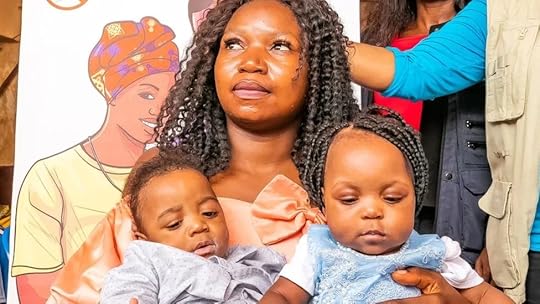
Above are the first two Cameroonian children to be vaccinated in 2024
Currently, this vaccine is offered free to the nations with the highest rate of disease. We are in desperate need of good news for the world and mankind. And today we have it. Check out this video for more information.
Your comment/reply below is welcomed.
Join my reading audience
By clicking submit, you agree to share your email address with me to receive future blogs. Use the unsubscribe link in those emails to opt out at any time.
Processing… Success! You're on the list. Whoops! There was an error and we couldn't process your subscription. Please reload the page and try again.January 20, 2024
Borrowed Water, Buying Time
I grew up on the farm in Nebraska learning that the water we used was given by the clouds that rose above us. It filled our wells and nurtured our stomachs with the food it provided. My dad monitored our rain gauge regularly to manage our livelihood.
We all need water and, surely, we have all have heard plenty about the climate-change debate. However, on my travels abroad this past year, my interest in its impact rose to a new level when I visited two iconic African regions. The first, being the Okavango Delta in Botswana fed by one source called the Cuito River. The terminus of the river’s tentacles branch out like fingers to create Okavango Delta, two countries downsteam, a rich fertile land teeming with wild animals and birds until it ends in the Kalahari Desert.
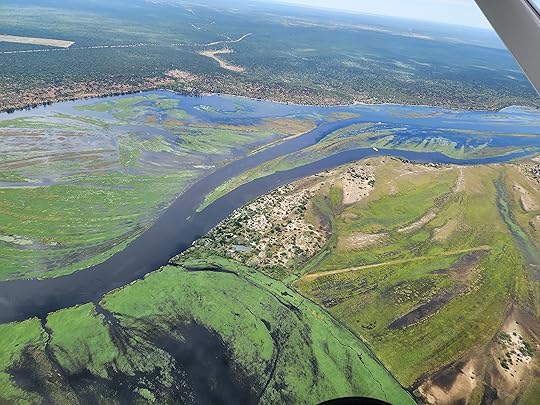
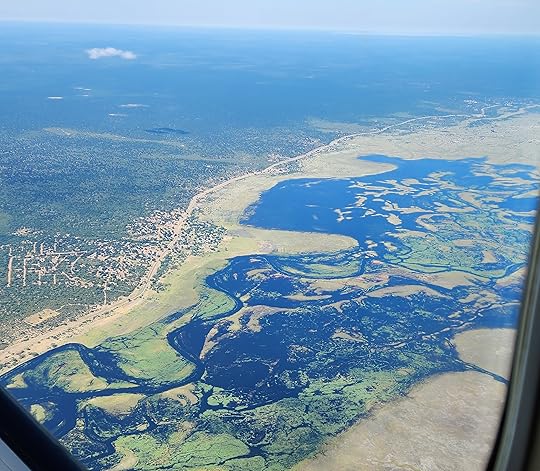
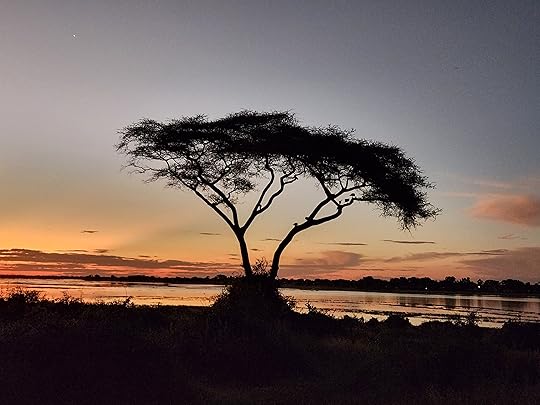
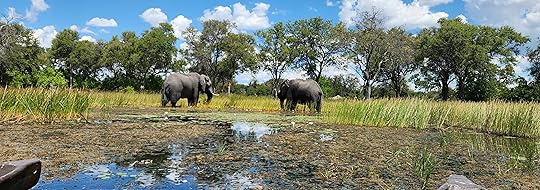
The second body of water was The Nile River in Egypt. The Nile is a large ribbon of water dividing the Sahara Desert from it’s southern border with Sudan all the way to the Mediterranian Sea in the north. Fertile farmland, bird life, camel caravans, and livestock are common along its banks
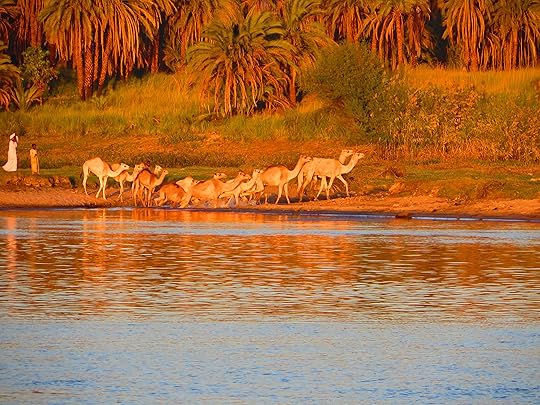
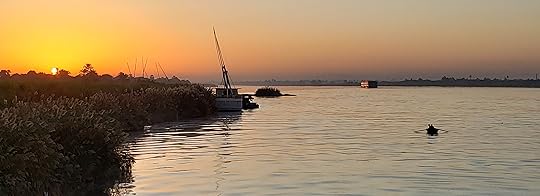
What do these two African rivers in common? They are living and thriving upon, what I call, borrowed water. The water that nourishes these two regions does not always fall from the sky above them. The majority of the rain doesn’t even fall in the country in which they reside. The source of these rivers are far, far away in other countries.
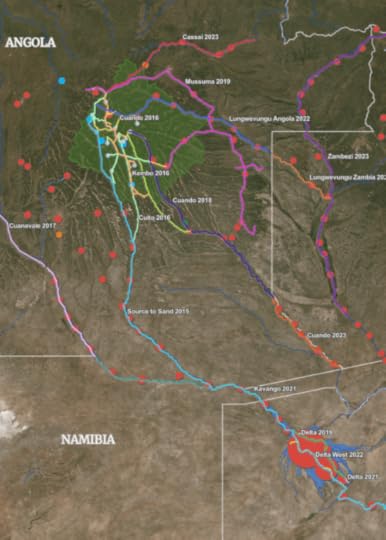

The first map above shows one source of the the Okavango Delta fed by the Cuito River in Angola, two countries north of Botswana. The second map illustrates that the one source of The Nile, the Ethiopian Blue Nile, two countries to the south of Egypt. Therefore, neither Botswana nor Egypt have any control over the water that benefits their land. In the past when rain and water were plentiful and humans did not overpopulate the regions, this resource was not a concern. During the time of my visit to both countries in 2022-23, the lack of water was a discussion by both of my tour guides.
I need not tell you what will happen to the Okavango Delta and the Nile region when their source of water is diminished.

The capital of Angola is now booming after 27 years of civil war, but the land management of the area that feeds the source of the Cuito River is non existent. Massive tundra fires by villagers to flush out the wildlife for food or slash burning farmland has altered the entire landscape creating less water flow. It is speculated that this mismanagment could evenually create a desert environment. Attached is a nighttime satellite-based view of the Angolan fires noted in RED. The bright light on the upper left is the capital.
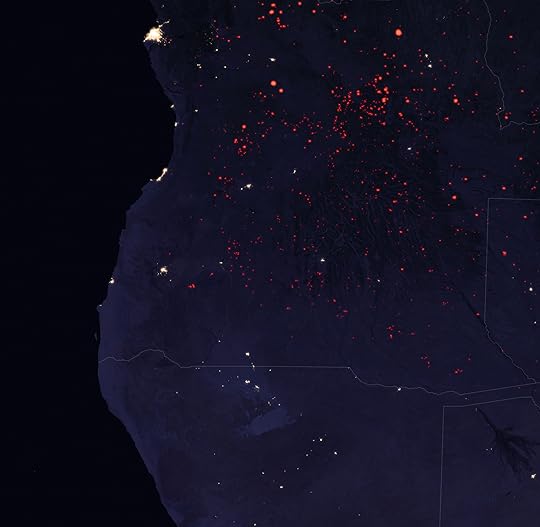
The demise of this region has only been recently revealed in 2018. Here is a trailer of this discovery in a powerful documentary entitled Into the Okavango. (One would need Disney+ to view it in full. The free download attached to this trailer is not the video and not as good as the one with the subscription) With the help of this research, there is a commitment with Namibia and Angola to work together with Botswana to help preserve its watershed.
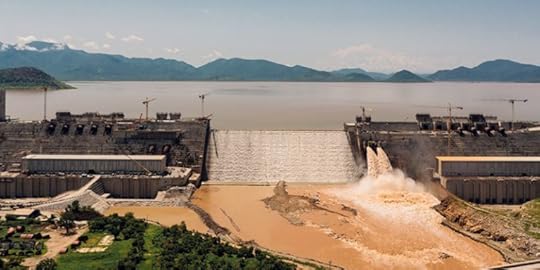
On the other hand, the major concern for Egypt is that Ethiopia has built a large dam called the Grand Ethiopian Renaissance Dam (GERD) on the Nile’s source (the Blue Nile) which supplies 85% of the water to the Nile in Egypt illustrated in the second map above. This dam harnesses and controls the water for irrigation and hydoelectric power for Ethiopia’s growing population. Learn more by reading this article written by the BBC in September 2023.
[image error]Pexels.com" data-medium-file="https://susangreisen.files.wordpress...." data-large-file="https://susangreisen.files.wordpress...." src="https://susangreisen.files.wordpress...." alt="" class="wp-image-5348" style="width:858px;height:auto" srcset="https://susangreisen.files.wordpress.... 1024w, https://susangreisen.files.wordpress.... 150w, https://susangreisen.files.wordpress.... 300w, https://susangreisen.files.wordpress.... 768w, https://susangreisen.files.wordpress.... 1635w" sizes="(max-width: 1024px) 100vw, 1024px" />Photo by Mariana Montrazi on Pexels.comAt the time of this writing there are no official country treaties or agreements of how to share this valuable resource; only a handshake from Angola with Botswana, and more contensious political issues lie between Egypt and Ethiopia. The clock is ticking for these countries, their people, and their livelihood. Tourism is a main industry for both Botswana and Egypt for which they rely on their precious water resource. Maybe the title of this blog has more meaning; Borrowed Water, Buying Time.
Your comments are greatly appreciated below. Share your thoughts with others. Your email info is only shared with me and not the public.
Addendum: The Colorado River in the US, that feeds water to the arid Baja in Mexico, has a similar story. The 1944 agreement between the US and Mexico was signed, but as populations grow and climate changes, the timeline and outcome for over 40 million people in these two countries who depend on this water, have an uncertain future. Are we/they, merely BUYING TIME?
January 11, 2024
Professional Tourist OR Global Citizen?
One thing I’ve learned as a writer, our readers are interested in our qualifications. I never paid much attention or tallied how many countries I’ve traveled over my lifetime. However, when I wrote my first book, it was a question I was asked in my book proposal about what qualified me to write about living and traveling abroad. So, I sat down with the world map and started to plot out how many countries I visited and/or lived in. At the time of my book publication I had a total of 40 countries. And currently, I have a tally of 50 on 6 continents. It is not a brag, just a fact.
[image error]Pexels.com" data-medium-file="https://susangreisen.files.wordpress...." data-large-file="https://susangreisen.files.wordpress...." src="https://susangreisen.files.wordpress...." alt="" class="wp-image-4833 size-full" srcset="https://susangreisen.files.wordpress.... 1024w, https://susangreisen.files.wordpress.... 150w, https://susangreisen.files.wordpress.... 300w, https://susangreisen.files.wordpress.... 768w, https://susangreisen.files.wordpress.... 1880w" sizes="(max-width: 1024px) 100vw, 1024px" />After my travel hiatus due to the pandemic, I packed in 9 countries within 6 months on three transatlantic flights starting in Decemeber of 2022. I was starved. Now, my cup runneth over as I was firehosed with more historical information and culture than my tiny brain could hold. I am still digesting some of it.
Unlike almost all of my previous travels, this time, I decided to take organized travel tours. I could end up spending months in planning these trips, which I didn’t want to do. So, I traveled with 8 to 12 tourists in 4 different groups with Overseas Adventure Travel (OAT). And I’m glad I did.
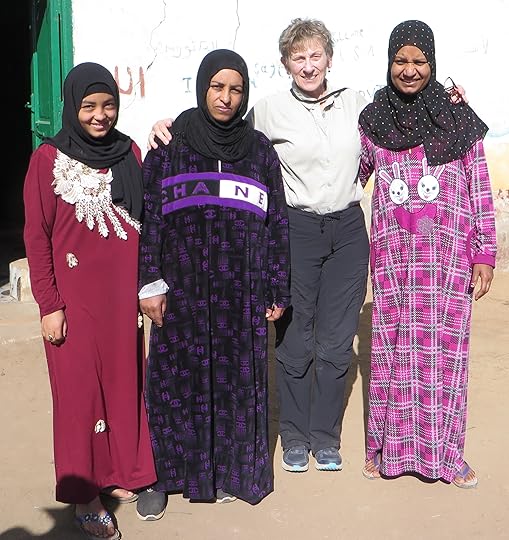
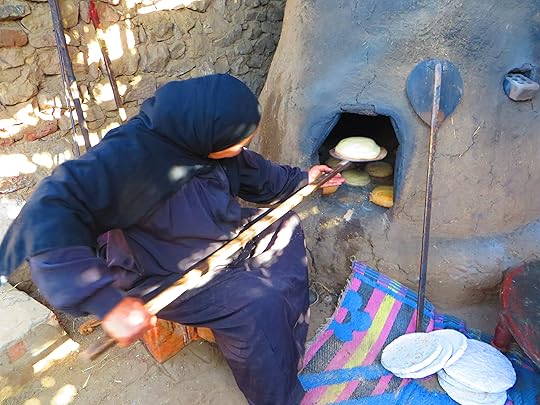

It was the best way to spend efficient time experiencing as much as possible. OAT integrates their tourists with the locals that includes visits to their homes, farms, schools, as well as cooking and dining with their familes. I loved that part. It was the closest thing to a Peace Corps experience in a short amount of time.

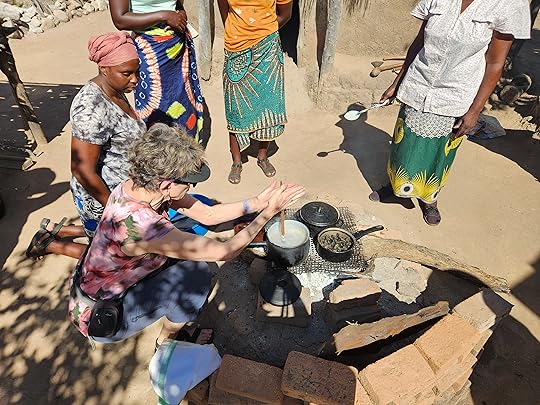
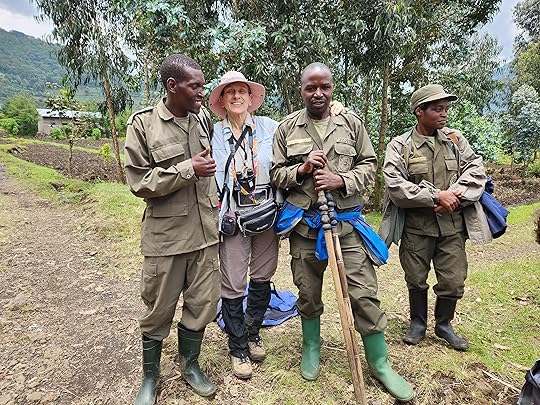
However, I sensed a difference between me and my fellow toursits. Only a handful had lived abroad, and those who had, served in the armed services and were in military housing. I, on the other hand, had lived in the village or towns where I worked – among the people. In my latter years of travel, I was less conscious about checking tourists spots off my bucket list. I wanted to experience the people and their culture like I did in the Peace Corps. Again, only a few select tourists in my groups were on board for that reason.
I noticed when there was an option to sit and speak to a local (a guide, chef, mother, child, etc) instead of another tourist, their spouse or the white business owner, I took that opportunity. I have an uncanny comfort with people I don’t know. I didn’t care their about skin color, what clothes they wore, how they covered their head, or if a language barrier existed…we just communicated. Being an extreme extrovert and having a healthy curiosity helps with that.
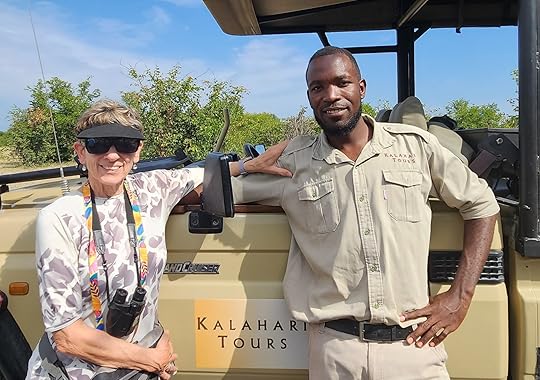
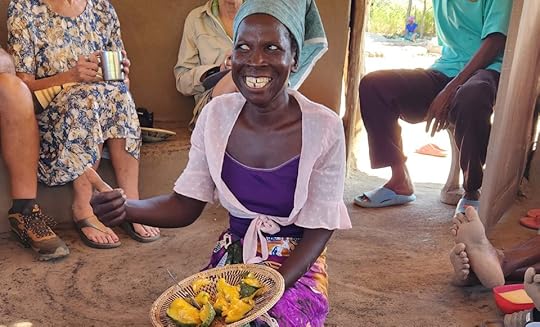
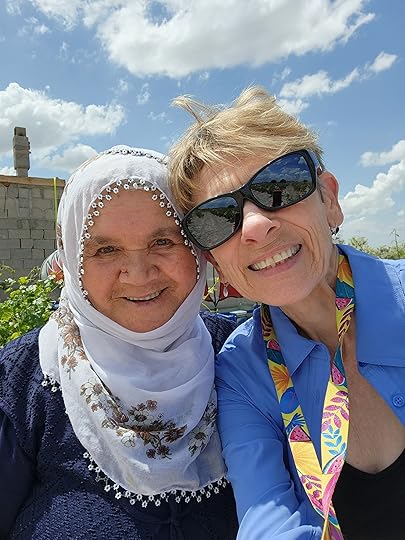
There’s NO right or wrong regarding how or why we travel in the world. I think of myself as a global citizen rather than a professional traveler checking off a bucket list. It is now my preference of travel. From my father’s famous words when asked why he wanted to go to a location unknown to him, he answered, “Because I’ve never seen it before.” I, too, want to go to new places. I want to continue to learn about the world and her people – to grow and understand. Doing so will help me gain empathy about areas and people unknown to me. I, in turn, can help others to appreciate and understand diversity.
How do you travel? I look forward to your comments.
January 3, 2024
African Women Taking Charge
It had been over 5 decades since I lived, worked, and traveled in Africa. Now, 50+ years older, I return as a tourist with my goal to experience the people and culture and not focus on a bucket list of seeing the big “FIVE”. (I did, however, have the Rwandan Gorillas on my list that I did write about. But the Rwandan people were so remarkable that I wrote about them separately in an earlier blog.)
In March of 2023, I traveled to 5 African countries I had never visited before: Rwanda, South Africa, Zimbabwe, Zambia, and Botswana with an organized tour, Overseas Adventure Travel (OAT). I recall the peril of African women when I lived in Liberia from 1971-73 and again in Cameroon from 1980-82. I wondered if the status of women had changed in the heart of Africa.
“Yes and No.”
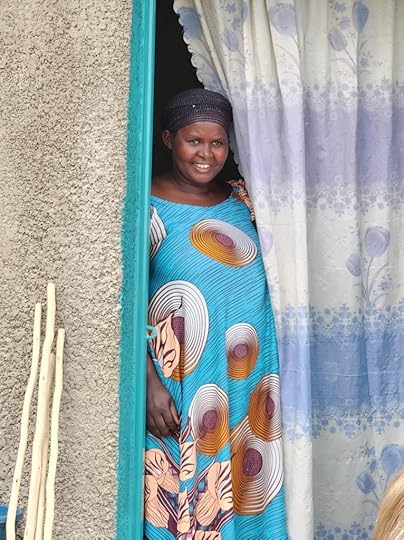
In all of these countries, I saw Women’s Cooperatives; signs of empowerment with women-owned businesses in many areas, even in the villages. My observation is that Africa remains, predominantly, a patriarchal society with women still paying a high price. Fifty years ago, divorce was unheard of. Now, it can happen in many counties due to infidelity, no financial family support, an absent spouse, or other reasons. With more women supporting their families, and too old to remarry, many cooperatives were created with the help of NGOs or Faith-based entities.
I was pleased to see African women taking charge of their destiny.
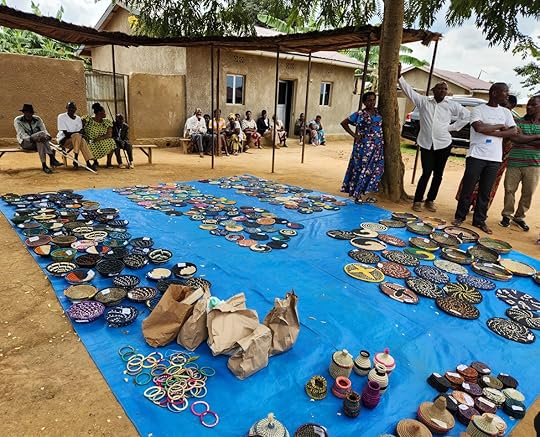
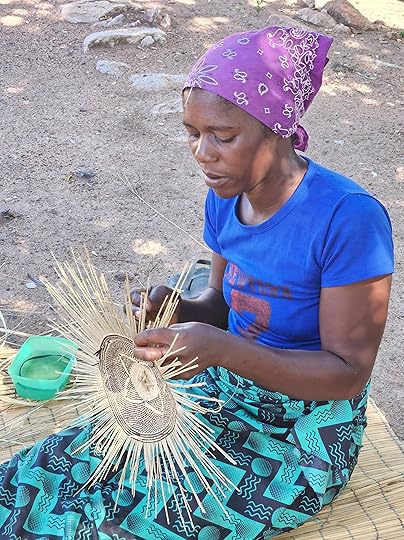
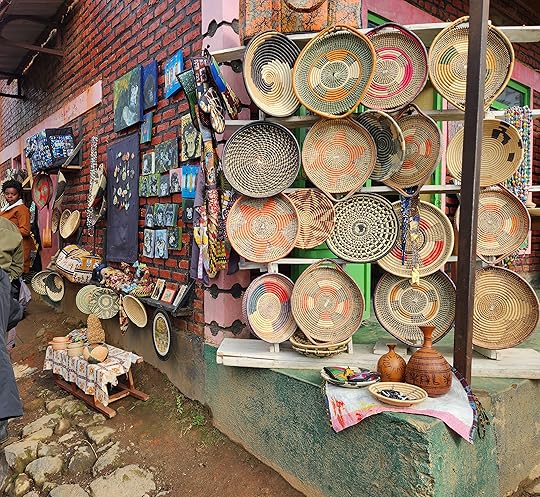

By using their current or newly acquired skills, they are selling their wares to the public: food products, baskets, clothing goods, or pottery, just to name a few. Even if they were married, it is a way to supplement the family income. I was fortunate to visit several of these cooperatives on my tour and buy their creations from the women directly. Here is my basket made by Elizabeth. There’s a baby tied to her back.
When I arrived in Zimbabwe, our female tour group was able to have a conversation with the women working at our safari camp. All of the 5 women had children but one, and none of them had a supportive man/husband in the picture. The children were cared for by aunts, sisters or mothers while they worked 24/7, on three weeks, off one week. None of them truly desired marriage except for the one woman who had no children. The explanation is complex and historical in nature. The ethnic groups in this region were nomadic historically; herding and hunting. During colonial times, industry and jobs for the men lured them to the large cities, leaving the women and children tending to the crops and animals. Polyamourous relationships now seem the norm. The women still need to care for their children and some have sought hospitality jobs in tourism.
I want to say this is not the case for all African men. In fact, two of our tour guides, very sincere and kind men, spoke very highly of their wives and children. Here are two of them.
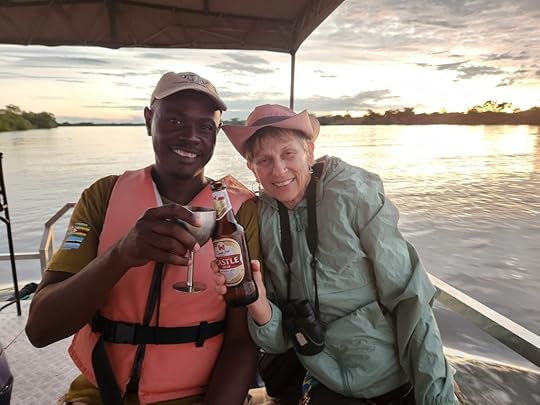
Dumi, our main OAT guide
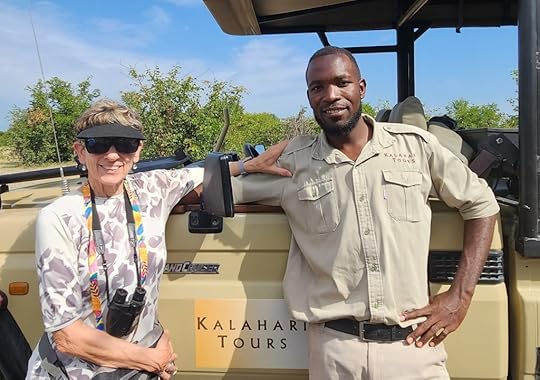
Dima, our safari driver for Botswana
To some of my followers this blog may be difficult to read without judgement. However, not so long ago, many women in America were, and still are, judged. For example, a woman friend, my age, who had become a young grade school teacher, was told she needed to vacate her position when she married. And two of my pregnant high school classmates had to leave their senior year and could not graduate. Pregnant women in schools were not to be seen back then. Judgement is still among us, but progress of women’s rights have been made.
I’m happy to hear of the progress African women have made. They are truly the backbone of Africa. I write about this affectionately in my poem called Fulani Woman, Liberian woman.
I look forward to your reply below.
Join my Mailchimp audience
By clicking submit, you agree to share your email address with the site owner and Mailchimp to receive marketing, updates, and other emails from the site owner. Use the unsubscribe link in those emails to opt out at any time.
Processing… Success! You're on the list. Whoops! There was an error and we couldn't process your subscription. Please reload the page and try again.December 31, 2023
Sunrise Sunset 2023
As the sun’s rosey glow brought us 2023, much has happened in our lives and around the world and I have many things to share with my readers. But as the sun sets on this December, I want to end with some photos I’ve taken through the year. Some I have written about and others will be explained in my upcoming blogs. Enjoy, and wishing you a healthy and splendid New Year.

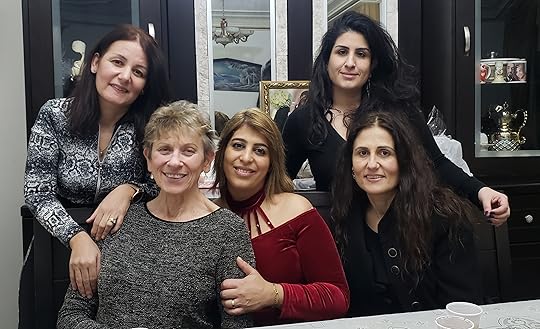
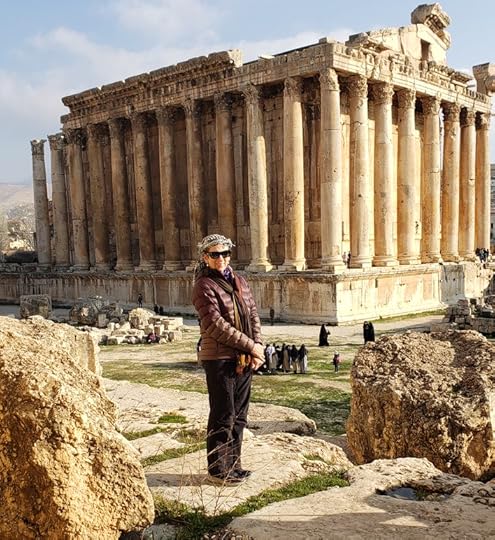
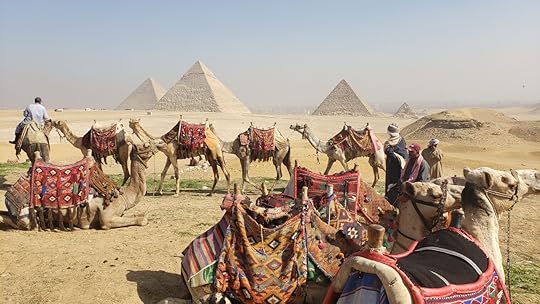
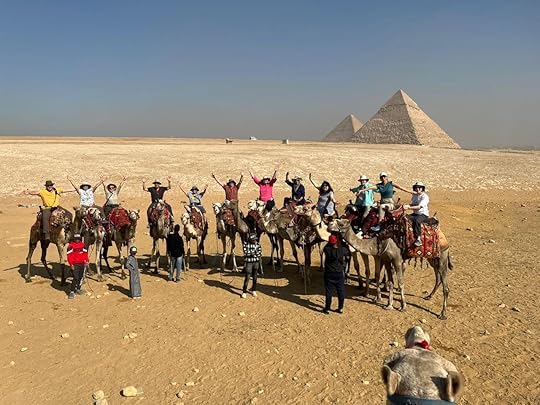
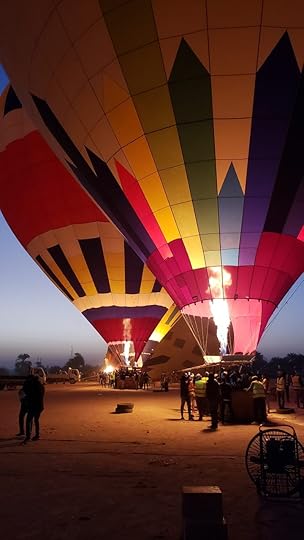
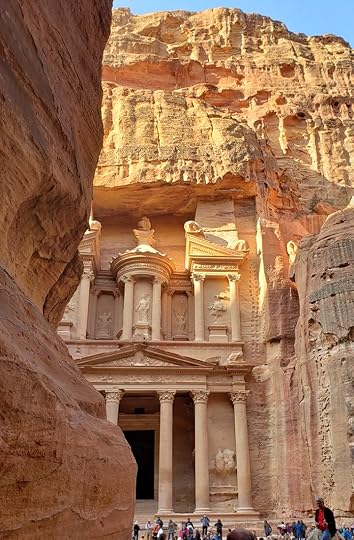
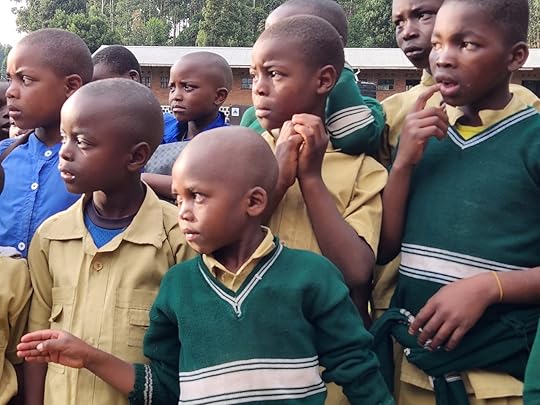

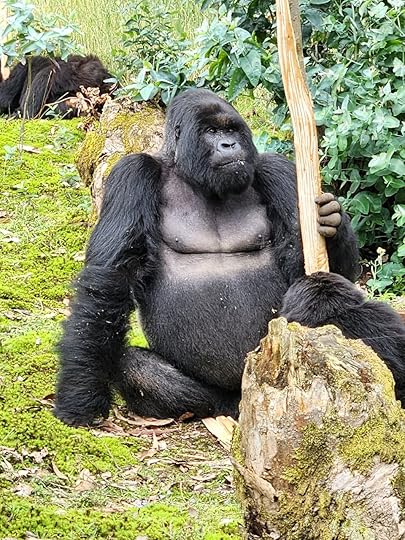
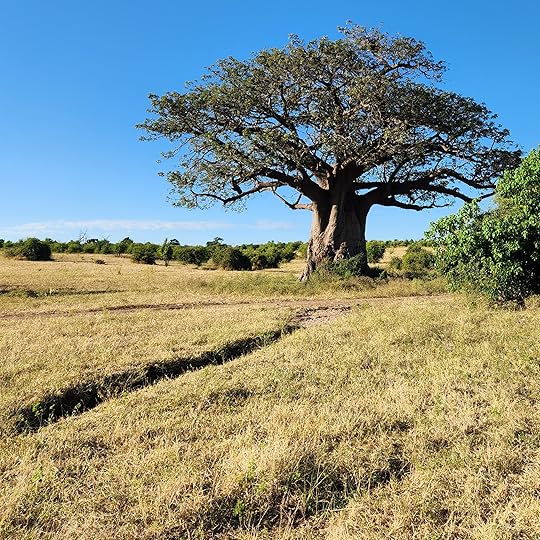
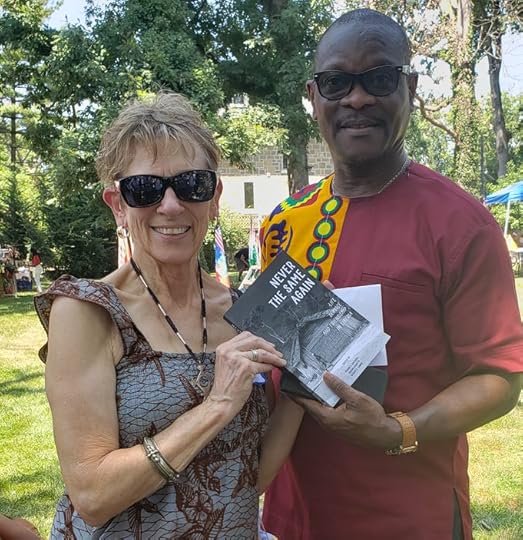
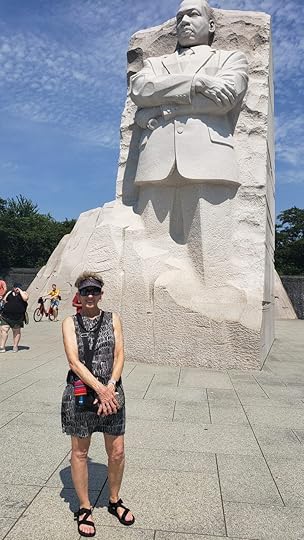
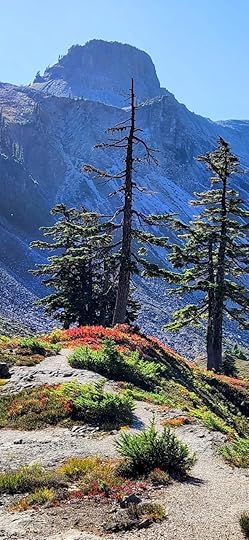
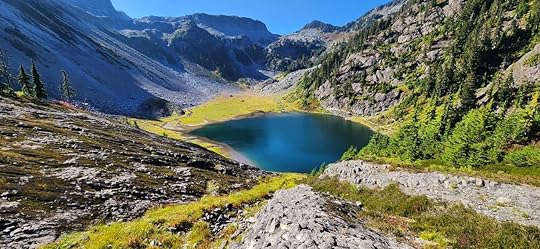
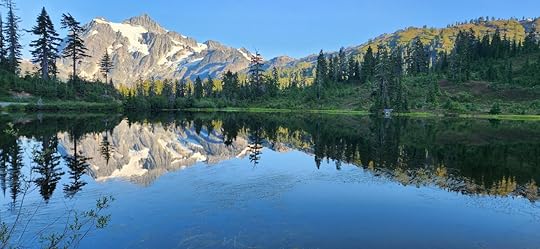
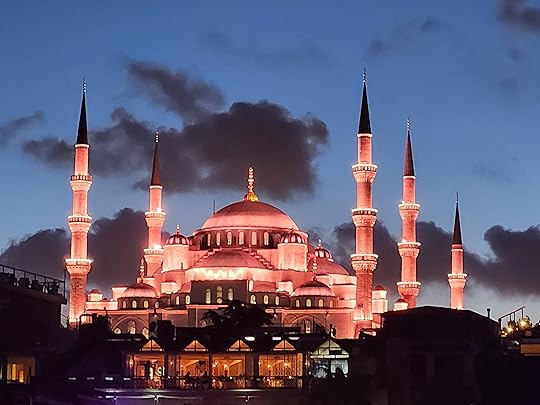
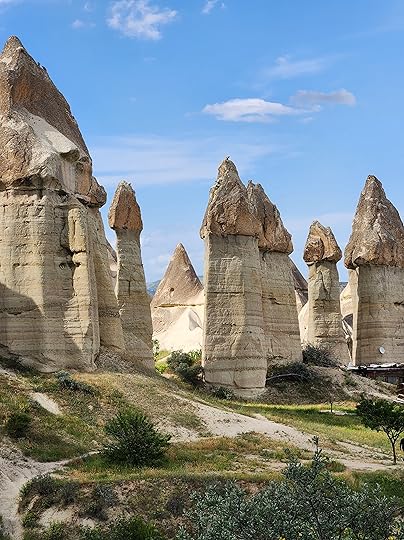
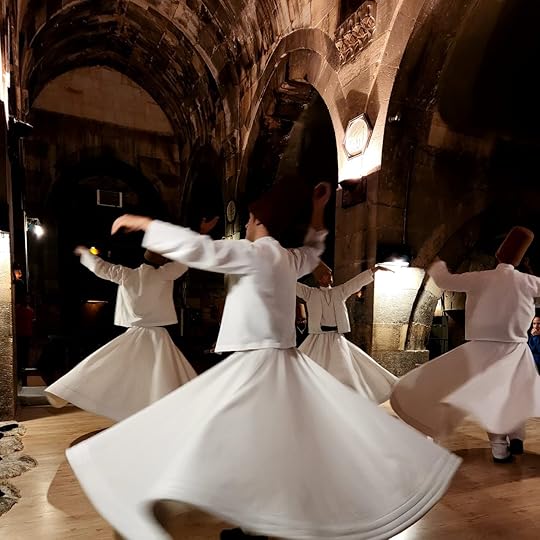

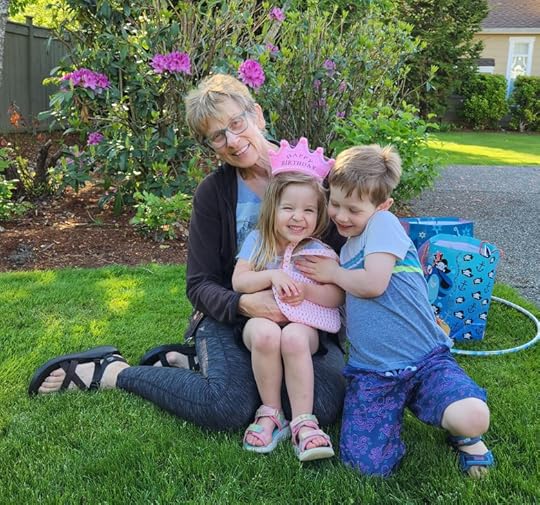
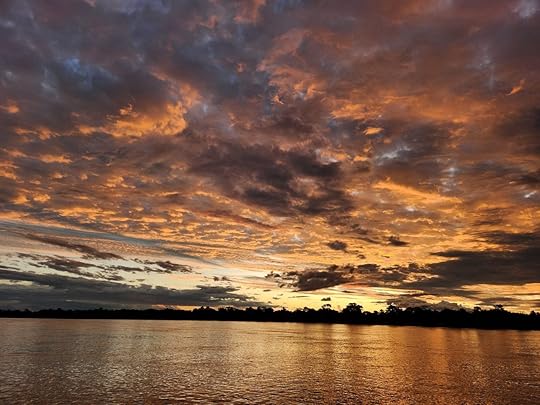
December 1, 2023
Random Acts of Brownies
The holidays are not always special and joyous for everyone. I recall a period in 2016 when my divorce was final at Christmastime. The next several months were trying. I housesat, rented, and moved several times, deciding where I wanted to land. I am resurrecting a story I wrote at the end of that period. In those tough times, my friends and family were there for me, but more surprisingly, and just as meaningful at the right times, were the people in this story who came into my life. And, I have never forgotten them. During this holiday season please think about those not as fortunate. A little kindness goes so far!
Random Acts of Brownies – Written on July 4, 2017
Who deserves such a gift?

A Ukrainian cobbler and his son who met my demands for ten items with no questions, no notes, no comments – just a ticket number as a reference. One week later all items were repaired just to my specifications.
Then there was the intrepid task to become a newbie to Medicare. My insurance broker took all my needs and so kindly put them in a spreadsheet. With a smile she helped me choose a health plan that was a small amount out of my social security check providing me better care than I already had.
There was the Tire Dealership who met my each and every need over the years with either new tires, free rotation or tire repair. Many times I was met with new faces, but given superior service every time.
The cherished provider at my friendly computer service center met all of my complex, multi-page list of high tech computer concerns with each and every appointment I made. When I feared I had lost my entire memoir, he handily retrieved the file without a problem and all was repaired with a smile.
I can’t forget our horrendous winter which took a toll on my car parked outside in Seattle for six weeks. First it was a broken axle boot – a costly repair in Seattle. However, when I called my trusty mechanic in Bellingham, he quoted me a price for a third of the cost and told me I could wait until my return home.
Then my driver-door lock froze and would not function while in the frigid-zone of Seattle. For sure a $200 new lock was in order. My same mechanic referred me to a locksmith in Bellingham. I called for advice. He gave me a two-step home-method and all was fixed with no dollar outflow.
Moving my items to storage was my next big task. My pain in having my personal effects in three locations was met with the kindest person at the storage unit office. She even gave me the senior rate and prorated my final bill without asking.
In the midst of moving, living in different locations, I decided to jump into the bleak buyers real estate market. I met with a Zen realtor, with her no-nonsense approach, who neutralized my type-A, multi-demanding personality. She and her staff exuded calmness in light of my anxiety. And yes, she found me the perfect condo that I purchased.
I moved five times in eight months, and I was on a first name basis with the moving company. They provided me no-dent, no-scratch service without question and even gave me a frequent flyer rate.
In preparation for the purchase of real estate, I met with a loan agent. After thirty minutes of knowing every dollar I ever earned in my life, he gave me advice that denied him a commission, plus a $500 gift card.
My dentist and his staff of over twenty-five years of service have become like family. They knew every oral-hygienic pitfall I’ve ever had. Quality care, with the conservative approach, to spare me unnecessary out-of-pocket costs.
Then there was my personal medical scare that demanded immediate attention. Never did I expect an office visit the very next day with a substitute physician, exam, lab tests and ultrasound all before noon with my results by 6 PM.
Lastly, but without any less value, was a Yoga instructor who brought joy, peace and passion to her teaching. Yoga, during my heightened time of stress this past year, brought balance and calm to my chaotic life.
So what do these people have to do with Random Acts of Brownies, you may ask. Random people that came in and out of my life: a cobbler, healthcare broker, tire dealership, computer technician, car mechanic, locksmith, storage manager, realtor, moving company, loan agent, dentist, doctor and a yoga instructor.
The gleeful surprise on each face was priceless when I delivered, unannounced, fresh baked brownies to each workplace with a heartfelt thank you. Wasn’t each person just doing their job, you might ask? Maybe so. But here is what was different.
When a person remembered my name; when they provided the service I asked, no matter how complicated; when they smiled and asked “was there anything else” even though I’d asked fifteen questions; when they provided top quality service each and every time; when they provided advice that denied them a commission; when they solved my problem over the phone without asking me to come in to charge me a fee for advice; when they took an extra step to prorate my service fee; when they called radiology and asked for a same-day appointment when there was none; when they brought passion and joy to their job that transcended to my wellbeing.
These are the individuals and groups who deserve my brownies. And, no, my giving was not random. Those who brought a warmth to my heart for their work and effort deserved something special. Many service jobs are thankless. I would know as I worked in one for over forty-five years. Those who go over and beyond to make me feel that I am the only person needing their service – even if it is for just that moment – deserve a special thanks.
In a time when hate and self-righteousness can permeate the air, I look to these service providers who give me hope that there is goodness in the world and good people in it. Thank you all for your service and for all the others who make clients and customers feel special.
I continue to give random acts of brownies today.
Feel free to scroll to the bottom of this blog to leave a comment or reply.
[image error]Posted with Blogsy
November 25, 2023
Curiosity, Commonsense, and Courage
I’ve been classified as crazy, stupid, or just a wonderment to many who know me. Some of my choices may have seemed foolish and maybe even daring, but in my seventh decade of life, there was always a method to my decisions – a trilogy of sorts: Curiosity, Commonsense, and Courage.
CuriosityI continually wonder about what life, people and cultures are about, other than my own. What would it be like to live like them for a day, a week, or even years?
CommonsenseI call this my set of triaging skills from everything I have learned in life, from birth until now, and I use them in a variety of ways. These are my critical thinking skills.
CourageSome people call me brave for the places I’ve been or the things I’ve done. I believe I have a high-risk tolerance. This characteristic was built on a lifetime of experiences.
The common denominator in all of these is that “I do not let fear rule me.” I utilize fear that is justified and is ever-present just under the surface, but I am not paralyzed by the “what ifs.” You will hear more about my life experiences and travels (past and present) as I often “bump the edge”. I’m rarely satisfied with the superficial, but dig for a deeper meaning. I have several blogs in the queue that I can’t wait to share. Curiosity killed the cat!! Not me. Welcome aboard!
Join my reading audience
By clicking submit, you agree to share your email address with me for my regular blogs. Use the unsubscribe link in those emails to opt out at any time.
Processing… Success! You're on the list. Whoops! There was an error and we couldn't process your subscription. Please reload the page and try again.October 12, 2023
Outstanding Community Service Award
The National Peace Corps Association (NPCA) is pleased to announce the Friends of Liberia (FOL) as the winner of the 2023 Loret Miller Ruppe Award for Outstanding Community Service. (Click on any highlighted area for links to more information.)
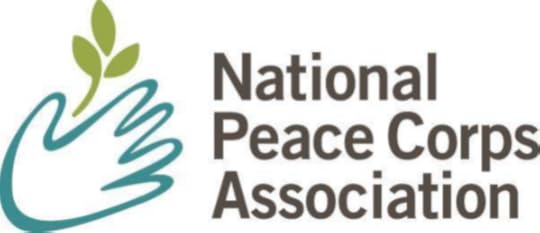
NPCA members selected FOL for this year’s prestigious award, recognizing the group’s publication of Never the Same Again: Life, Service, and Friendship in Liberia.
Chief editor, Susan Greisen, and co-editors, Susan Corbett and Karen E. Lange, collaborated with more than 100 people across seven time zones via Zoom, email, text, WhatsApp, FaceTime, and phone to realize their final publication in less than two years – all during the COVID pandemic. The proceeds from this powerful anthology benefit educational, social, health, economic, and humanitarian programs in Liberia. WATCH Friends of Liberia Ruppe project video to learn about these programs and why we won.
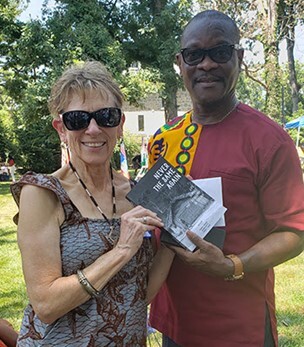
Here is Susan Greisen with his Excellency George S.W. Patten, Sr., Ambassador Extraordinary and Plenipotentiary of Liberia, in Wash. D.C. the summer of 2022 as they celebrate the 60th Anniversary of Peace Corps in Liberia. The annual Loret Miller Ruppe Award, named after the widely admired 10th director of the Peace Corps, is presented by NPCA to recognize the Third Goal accomplishments of RPCV Affiliate Groups and to share ideas and practices that other groups can emulate.
If you would like to support our humanitarian programs in Liberia, please consider buying this AWARD-WINNING ANTHOLOGY as a holiday gift. They can be purchased (shipped for 99 cents in the US) at https://fol.org/anthology/ or bought wherever fine books are sold including Amazon. eBooks are also available. For our international readers, Amazon in your country sells our anthology. Thank you all for your support.
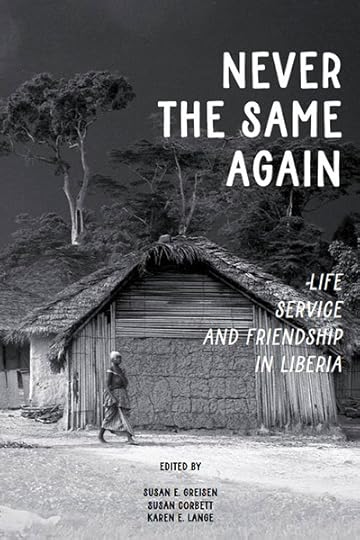
I look forward to your reply/comments in the section below.
August 26, 2023
Gorilla Doctors of Rwanda
Click on any highlighted area for more information. All photos for this blog are from the internet.
I have always been skeptical of habituating wild animals to humans. I’ve seen the damage this has done to the bears in the National Parks in the 60s when I vividly remember traveling in Yosemite as a 12-year-old with my family. Dad encouraged us to crack our car windows to feed bread to the bears…and, so we did. We have home movies of this insanity. Over ten years later when I tent camped there again as an adult, bears were rummaging campgrounds to access the campers’ delicacies. That night armed rangers roamed our campsite tranquilizing the bears as they ripped open a Fiat convertible seeking store-bought food. The damage humans have done is evident. My third blog on Rwanda provided me with another great lesson about humans and wildlife.
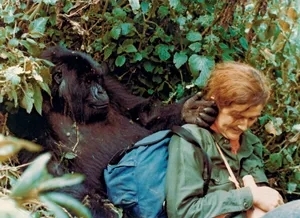
Now, 60 years later, what good would it do to habituate wild gorillas to humans in Rwanda and Uganda? Eventually, the reason became clear in the 1960s, when Dian Fossey, an American primatologist, did her research of the gorillas. Only about 250 lived in the wild in Rwanda at that time.
As I had said in my last blog, poachers where killing and capturing them at unprecedented numbers. In addition, villagers were encroaching into their habitat, and humans and their proximity to each other was a concern for disease transmission. As Fossey continued her research, she sought to protect the gorillas to prevent poaching and injuries from traps. When Fossey was tragically murdered in 1985, her 20-year effort to protect the gorillas continued and the gorilla population gradually increased. Ultimately, AWF (Africa Wildlife Foundation), the Fauna Preservation Society, and the World Wildlife Fund formed a consortium to bring various funds and initiatives under one tent and help fulfill Rwanda’s request to preserve the gorillas. The Mountain Gorilla Project, with AWF at the helm, focused on capacity-building, anti-poaching, and awareness-building. The project also worked to habituate mountain gorillas to tourist groups, and training Rwandan rangers about guiding.
By the end the 90s, tourism income was Rwanda’s largest earner of foreign exchange, making gorilla protection a national priority. During this time, a young conservationist and former Peace Corps volunteer from Zaire, Craig Sholley (today AWF senior vice president) joined the project. Rwanda now has over 1000 gorillas (10 families) and still growing.
On my Feb/Mar 2023 tour with OAT (Overseas Adventure Travel) we spent 90 precious minutes with Dr. Gaspard featured in the video below. Despite the efforts, snares are still an issue as hunters set traps to capture other small animals. So, with cooperation from the Rwandan government, veterinarians gradually habituated themselves with the gorillas so they could get close enough to provide care. Overtime, this was achieved. Click on this video of the Doctors in action.
The genetics separating the gorillas from humans is very small; we share 96-98% of the same DNA. Just as one human might be over protective of their child, the gorilla parent is no different.
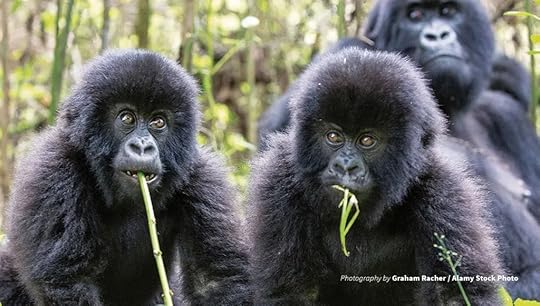
Recently when a baby gorilla’s leg became snared in a poachers trap, initially the silver back would not let the gorilla doctors approach. After a few days the silver back understood and allowed the doctors to release and treat the baby with success.
As far as the gorillas are concerned, I now think differently about wildlife habituation. This human interaction has not only allowed medical treatment to occur, the gorilla population to grow, but also gorilla tourism to flourish which benefits the country and her people as well. A Win Win for all. Let’s be mindful of the balance of our precious home called EARTH.
Join my email list for periodic blogs with companion photos and stories of my travels
Processing… Success! You're on the list. Whoops! There was an error and we couldn't process your subscription. Please reload the page and try again.



